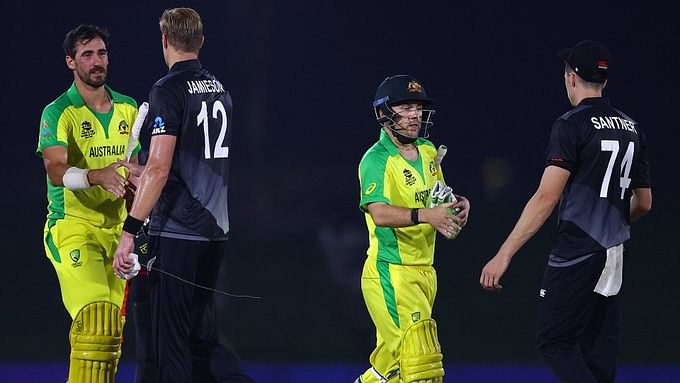New Delhi: Australia and New Zealand won thrilling encounters against England and Pakistan to set up a Trans-Tasman final, but only after winning the toss and sending their opponents out to bat first, a common theme that has been present throughout the 2021 ICC Men’s T20 World Cup tournament.
Those who followed India’s early elimination know well that both the defeats India suffered were after Pakistan and New Zealand won the toss, chose to bowl first and restricted India to low scores before chasing them down with ease.
The talking point for the past three weeks has revolved around an oft-repeated dictum: ‘Win the toss, win the match’.
Out of the 23 matches played between full-member nations from the Super 12 round onwards, 18 were won by the team chasing, and 15 by the team that won the toss.
The exceptions to this trend were South Africa’s consolation 10-run win over England, England’s 26-run win over Sri Lanka, Sri Lanka’s dead-rubber defeat of the West Indies, Bangladesh’s overall poor showing regardless of the toss, and all three of Afghanistan’s defeats.
For years, Afghanistan has employed its preferred tactic of taking the conditions out of the equation by putting runs on the board first and then employing their spinners to put the squeeze on the chasing side. Similarly, the signs of Bangladesh’s downfall were already visible from their first round defeat to Scotland and unconvincing moments against Oman and Papua New Guinea.
But for full-member games excluding Bangladesh and Afghanistan — 15 in number — the impact of the toss and difference between setting a target and chasing became all the more apparent.
Out of these 15, only the South Africa-England, England-Sri Lanka and Sri Lanka-West Indies games mentioned above were won by the team that not only lost the toss but also batted first.
In the other 12 games, low strike rates, poor timing and middle-overs collapses resulted in numerous one-sided blowouts, and subsequently skewed net run rates, which South Africa bore the brunt of even after winning four out of their five games.
Also read: Wade stuns Afridi, Australia plays on Pakistan’s nerves yet again in a T20WC semifinal
‘Undue advantage’
Indian cricket followers know by now that the only defeats India faced in the tournament were after losing the toss and being sent out to bat first. This has not only been addressed by fans and media, but also by players and coaching staff.
India’s outgoing bowling coach Bharat Arun was among those who decried the bigger role of the toss during the T20 World Cup. While not offering the toss losses as an excuse for the team’s early elimination, Arun said the toss did provide an “undue advantage” to the chasing side at a venue like Dubai.
“…the wicket kind of eases out when you come out to bowl the second time. But no excuses, we should have batted better. And also in the first match, we had a chance to defend our total but we looked a little below par…the toss plays a very very vital role, which I think shouldn’t — the toss shouldn’t be of any consequence,” Arun added.
Dew factor
The critical reason behind this apparent advantage to the team batting second is the dew factor during night matches.
“Dew forms during cool clear nights, when there is minimal wind and high water vapour content in the air at sunset. This means it forms best in equatorial climates where the humidity is high, particularly in coastal cities,” Marcus Parekh explained in The Telegraph.
Dew is especially detrimental to the team bowling second, because the white ball constantly gets wet after coming into contact with the grass during play, making it all the more challenging for bowlers to hit their lines and lengths with accuracy.
Dew has historically played a big role at venues in South Asia as well as the UAE, as witnessed in the majority of the last two seasons of the IPL.
Following Bangladesh’s famous victory over England in the 2011 ODI World Cup in Chittagong in which they chased down a target of 226, England off spinner Graeme Swann described his task in the second innings as “like trying to bowl with a bar of soap”.
However, Australian batting all-rounder Mitchell Marsh downplayed the importance of the toss in the days leading up to Australia’s semifinal against Pakistan in the ongoing tournament.
“I don’t think the toss is overly important. Most teams have obviously chosen to bowl first when they’ve won the toss. But the couple of games that I was there [in Dubai], the dew didn’t really come in. Obviously if you can bat first and post a big score then bowl well, you go a long way to winning,” Marsh told cricket.com.au.
While the dew didn’t seem to be especially apparent in either Abu Dhabi or Dubai during the semifinals as the teams batting first were in the ascendancy, the trend of the chasing side winning continued, as did the ‘win the toss, win the match’ dictum.
But unlike the early part of the Super 12s, the semifinals were far more competitive, with an expensive Chris Jordan over turning the tide for New Zealand and a 23-run Shaheen Shah Afridi over deciding the game in Australia’s favour.
The focus on the toss is likely to continue in Sunday’s Trans-Tasman final, which will also take place in Dubai, but it remains to be seen if the dew factor will dominate the occasion, or if the team batting first can reverse this trend.
Also read: Calm New Zealand’s explosive method as they get even with England, first to enter T20 WC final



